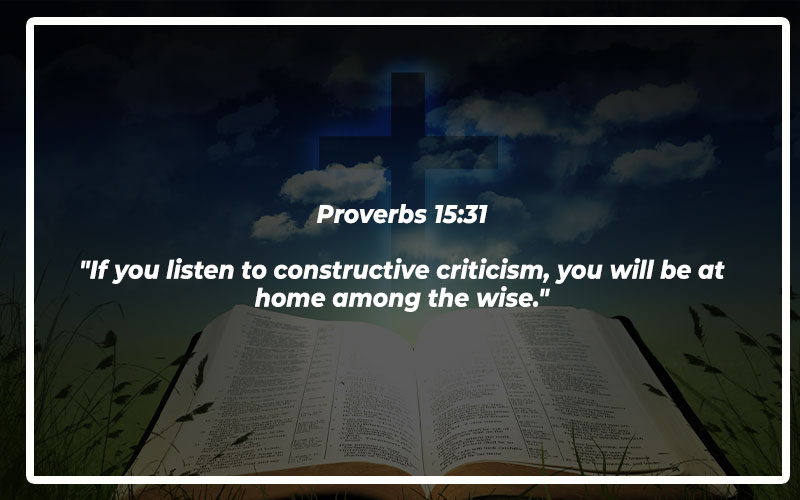Criticism is something we all face, but how we respond to it as believers is important. The Bible offers wisdom and guidance on handling criticism, whether it comes from others or is directed inwardly. Below are seven key themes about criticism with relevant Bible verses and commentary to help navigate this challenging aspect of life.
Also Read: Bible Verses About Being Responsible
Responding to Criticism with Humility
Criticism can often strike a blow to our pride, making it difficult to accept. However, the Bible encourages us to respond to it with humility, recognizing that correction can lead to growth. The humility to listen and consider criticism is an essential aspect of Christian maturity.
Proverbs 15:31
“If you listen to constructive criticism, you will be at home among the wise.”

This verse highlights the value of being open to correction. Rather than rejecting or ignoring criticism, those who listen and embrace it grow in wisdom. Constructive criticism, though sometimes hard to hear, is a gift that allows us to improve and better align with God’s will.
Proverbs 12:1
“To learn, you must love discipline; it is stupid to hate correction.”
The harsh language used in this verse stresses the foolishness of refusing correction. It is a call to love discipline, understanding that it is through correction that we learn and grow. Resisting criticism only hinders our spiritual and personal development.
James 4:10
“Humble yourselves before the Lord, and he will lift you up in honor.”
Humility is essential in how we respond to criticism. This verse reminds us that if we humble ourselves before God, He will lift us up. Accepting criticism is a form of humility, acknowledging that we are not perfect and need guidance from both God and others.
Proverbs 19:20
“Get all the advice and instruction you can, so you will be wise the rest of your life.”
This verse encourages a proactive attitude toward receiving advice and instruction. Criticism, when given in love, is part of the advice that can help us grow wiser. Wisdom is not something we achieve once, but a lifelong pursuit that often comes through correction.
1 Peter 5:5
“In the same way, you who are younger must accept the authority of the elders. And all of you, dress yourselves in humility as you relate to one another, for ‘God opposes the proud but gives grace to the humble.'”
This verse encourages believers to approach relationships with humility. When we are criticized, our natural response may be defensive, but humility allows us to receive feedback with grace, learning from those who correct us rather than rejecting them.
Discernment in Receiving Criticism
Not all criticism is constructive. The Bible calls us to discern between criticism that is helpful and that which is meant to harm or tear down. With the Holy Spirit’s guidance, we can distinguish between criticism that builds and criticism that destroys.
Proverbs 14:15
“Only simpletons believe everything they’re told! The prudent carefully consider their steps.”
This verse emphasizes the importance of discernment. Believers are called to consider the source and motive of criticism before reacting. We are not to accept all criticism blindly but to weigh it carefully, seeking wisdom in how to respond.
1 John 4:1
“Dear friends, do not believe everyone who claims to speak by the Spirit. You must test them to see if the spirit they have comes from God. For there are many false prophets in the world.”
This verse warns us to test the spirit behind any message, including criticism. Not every word spoken is from God, so we must be vigilant to discern whether the criticism aligns with God’s truth or is intended to deceive or harm.
Proverbs 18:15
“Intelligent people are always ready to learn. Their ears are open for knowledge.”
While we are encouraged to seek knowledge and wisdom, this verse also calls for discernment. Intelligent people listen carefully, and their open ears are discerning ears. They filter criticism through the lens of God’s truth and wisdom, accepting what is helpful and rejecting what is not.
Proverbs 17:27
“A truly wise person uses few words; a person with understanding is even-tempered.”
Wisdom is often displayed through restraint, especially in response to criticism. This verse encourages us to remain calm and measured when faced with criticism. Rather than reacting impulsively, a wise person carefully considers their response, showing understanding and patience.
Philippians 1:9-10
“I pray that your love will overflow more and more, and that you will keep on growing in knowledge and understanding. For I want you to understand what really matters, so that you may live pure and blameless lives until the day of Christ’s return.”
This prayer for growth in love and knowledge underscores the importance of discernment. When receiving criticism, we need God’s wisdom to understand what truly matters, allowing us to respond with grace and truth rather than defensiveness or bitterness.
Guarding Our Words When Giving Criticism
Just as we are called to receive criticism with humility and discernment, we are also cautioned to be mindful of how we offer criticism to others. Our words should build up rather than tear down, always motivated by love and truth.
Proverbs 18:21
“The tongue can bring death or life; those who love to talk will reap the consequences.”
This verse reminds us of the power of our words. When offering criticism, we must be mindful of whether our words are bringing life or death. Harsh or careless words can wound deeply, while thoughtful, loving criticism can encourage growth and healing.
Colossians 4:6
“Let your conversation be gracious and attractive so that you will have the right response for everyone.”
This verse encourages believers to ensure their words are filled with grace, especially when giving criticism. Criticism should not be harsh or judgmental but should be delivered with kindness and wisdom, allowing the listener to receive it without feeling condemned.
Ephesians 4:29
“Don’t use foul or abusive language. Let everything you say be good and helpful, so that your words will be an encouragement to those who hear them.”
This verse emphasizes that our words should build up rather than tear down. Criticism that is helpful encourages growth and is aligned with God’s desire for our communication. We must guard against criticism that is harsh or destructive, ensuring that our words are seasoned with grace.
Proverbs 12:18
“Some people make cutting remarks, but the words of the wise bring healing.”
This verse contrasts hurtful, cutting remarks with the healing words of the wise. Criticism should not be meant to hurt or belittle but to offer constructive feedback that brings healing and restoration. Wise criticism seeks to edify, bringing about positive change.
Matthew 7:12
“Do to others whatever you would like them to do to you. This is the essence of all that is taught in the law and the prophets.”
The Golden Rule should guide our approach to criticism. If we would want others to be kind and constructive when they offer feedback to us, we must do the same. This mindset ensures that our criticism is motivated by love and a desire for the other person’s well-being.
Also Read: Bible Verses About Being an Example
Criticism as an Opportunity for Growth
Though it can be uncomfortable, criticism is often an opportunity for growth. The Bible teaches that God uses correction to refine us, and we should see criticism, especially from godly sources, as part of His work in sanctifying us.
Proverbs 27:17
“As iron sharpens iron, so a friend sharpens a friend.”
This verse illustrates that criticism, when done in love and friendship, is a way of helping one another grow. Just as iron sharpens iron, godly criticism sharpens our character, helping us become more like Christ and improve in areas where we may be lacking.
Hebrews 12:11
“No discipline is enjoyable while it is happening—it’s painful! But afterward there will be a peaceful harvest of right living for those who are trained in this way.”
Discipline and correction may be painful at the moment, but they produce righteousness. Criticism, when seen as a form of discipline, trains us to live in alignment with God’s standards. This verse encourages us to endure the discomfort, knowing that it leads to greater spiritual maturity.
Psalm 141:5
“Let the godly strike me! It will be a kindness! If they correct me, it is soothing medicine. Don’t let me refuse it.”
The psalmist here welcomes criticism from the godly, recognizing that it is a kindness. Though correction may sting, it is like soothing medicine that heals. Accepting godly criticism is part of our spiritual healing and growth, leading us closer to God’s heart.
2 Timothy 3:16
“All Scripture is inspired by God and is useful to teach us what is true and to make us realize what is wrong in our lives. It corrects us when we are wrong and teaches us to do what is right.”
Scripture itself is a source of godly criticism, showing us where we fall short and how we can live rightly. As we study God’s Word, we are continually being corrected and refined, allowing us to grow in righteousness. Criticism grounded in Scripture is always meant for our good.
Proverbs 9:8
“So don’t bother correcting mockers; they will only hate you. But correct the wise, and they will love you.”
This verse contrasts two responses to criticism. Those who are wise will welcome correction, knowing that it is for their good. However, those who reject wisdom will respond with hatred. This teaches us that a love for wisdom makes us receptive to godly criticism.
The Role of Self-Criticism
While receiving external criticism is important, self-reflection and self-criticism are also valuable in the Christian walk. The Bible encourages believers to examine themselves regularly, allowing the Holy Spirit to reveal areas that need correction.
2 Corinthians 13:5
“Examine yourselves to see if your faith is genuine. Test yourselves. Surely you know that Jesus Christ is among you; if not, you have failed the test of genuine faith.”
This verse calls for self-examination, reminding us to regularly test our faith and ensure that we are living in accordance with God’s will. Self-criticism, guided by the Holy Spirit, is a way of staying on track in our spiritual journey and ensuring that our faith is authentic.
Psalm 139:23-24
“Search me, O God, and know my heart; test me and know my anxious thoughts. Point out anything in me that offends you, and lead me along the path of everlasting life.”
The psalmist invites God to search his heart, demonstrating the value of self-criticism. This is not self-condemnation but a humble request for God to reveal any offensive ways. Allowing God to critique us brings healing and aligns us with His path of righteousness.
Lamentations 3:40
“Instead, let us test and examine our ways. Let us turn back to the Lord.”
Self-examination is a key part of repentance. This verse encourages us to regularly test our actions and attitudes, allowing the Holy Spirit to reveal where we need to repent and turn back to God. Self-criticism, when guided by the Spirit, leads to spiritual renewal and restoration.
1 Corinthians 11:28
“That is why you should examine yourself before eating the bread and drinking the cup.”
This verse emphasizes the importance of self-examination before participating in Communion. It calls believers to take stock of their hearts and actions, ensuring they are in right standing with God. Self-criticism in this context is about making sure we approach sacred moments with the right heart and attitude.
Galatians 6:4
“Pay careful attention to your own work, for then you will get the satisfaction of a job well done, and you won’t need to compare yourself to anyone else.”
This verse encourages self-reflection and self-criticism without comparison to others. It teaches that we should focus on our own lives, measuring ourselves by God’s standards rather than by others. Self-criticism done in humility leads to personal satisfaction and growth.
Criticism from the World
As believers, we are often subject to criticism from the world because of our faith. The Bible prepares us for this and encourages us to stand firm, knowing that the world’s criticism is often rooted in its rejection of God.
John 15:18
“If the world hates you, remember that it hated me first.”

Jesus prepares His followers for the reality that the world may reject and criticize them, just as it rejected Him. Criticism from the world should not shake our faith but remind us that we are walking in the footsteps of Christ. Enduring worldly criticism is part of being His disciple.
2 Timothy 3:12
“Yes, and everyone who wants to live a godly life in Christ Jesus will suffer persecution.”
This verse makes it clear that living a godly life will result in criticism and persecution from the world. We are not called to seek the approval of the world but to remain faithful to Christ, even when facing criticism or hostility. Such trials strengthen our faith and commitment.
1 Peter 4:14
“So be happy when you are insulted for being a Christian, for then the glorious Spirit of God rests upon you.”
Peter encourages believers to find joy in worldly criticism, seeing it as a sign that God’s Spirit rests upon them. When we are criticized for our faith, it is evidence that we are living in alignment with Christ’s teachings. Such criticism should not dishearten us but affirm our walk with God.
Matthew 5:11
“God blesses you when people mock you and persecute you and lie about you and say all sorts of evil things against you because you are my followers.”
Jesus teaches that we are blessed when we endure criticism and persecution for His sake. Criticism rooted in our faithfulness to Christ is a cause for rejoicing, as it means we are living out His calling. This verse reminds us to remain steadfast in the face of worldly opposition.
Romans 8:17
“And since we are his children, we are his heirs. In fact, together with Christ we are heirs of God’s glory. But if we are to share his glory, we must also share his suffering.”
This verse connects the suffering we face, including worldly criticism, with the glory we will receive as heirs of God. Just as Christ suffered, so too will we face trials. However, enduring these criticisms is part of sharing in Christ’s victory and glory.
God’s Defense Against Unjust Criticism
While we may face unjust criticism, the Bible reminds us that God is our ultimate defender. We are not called to defend ourselves at all costs, but to trust in God’s justice and timing. He will vindicate us in His perfect way and time.
Psalm 37:6
“He will make your innocence radiate like the dawn, and the justice of your cause will shine like the noonday sun.”
This verse assures us that God will bring our innocence to light. When we face unjust criticism, we don’t need to fight for vindication. God Himself will reveal the truth, making our righteousness shine as clearly as the midday sun. Our trust should be in His ability to defend us.
Romans 12:19
“Dear friends, never take revenge. Leave that to the righteous anger of God. For the Scriptures say, ‘I will take revenge; I will pay them back,’ says the Lord.”
This verse encourages believers not to seek revenge or personal vindication when facing criticism. Instead, we are called to leave matters in God’s hands, trusting that He will handle justice. God’s judgment is perfect, and we can find peace in knowing that He sees every wrong.
Isaiah 54:17
“But in that coming day no weapon turned against you will succeed. You will silence every voice raised up to accuse you. These benefits are enjoyed by the servants of the Lord; their vindication will come from me. I, the Lord, have spoken!”
God promises that no weapon or accusation formed against His people will prevail. This verse provides comfort to those facing unjust criticism, reminding us that our vindication comes from the Lord. He will silence the voices of accusation and bring about justice for His servants.
1 Peter 2:23
“He did not retaliate when he was insulted, nor threaten revenge when he suffered. He left his case in the hands of God, who always judges fairly.”
Jesus is our perfect example of how to respond to criticism and injustice. Rather than retaliating, He entrusted Himself to God’s judgment. As followers of Christ, we are called to do the same, trusting that God sees every wrong and will judge fairly in His time.
Psalm 31:15
“My future is in your hands. Rescue me from those who hunt me down relentlessly.”
This verse is a prayer of trust in God’s protection and timing. When we are criticized unjustly, we can entrust our future to God, knowing that He will rescue and vindicate us. Our hope is not in our ability to defend ourselves but in God’s faithful care and deliverance.
Also Read: Bible Verses About Choosing the Right Path

